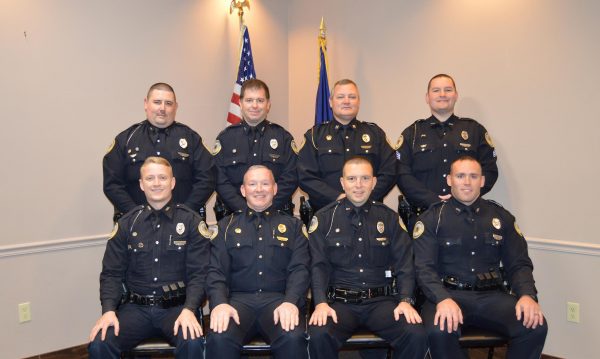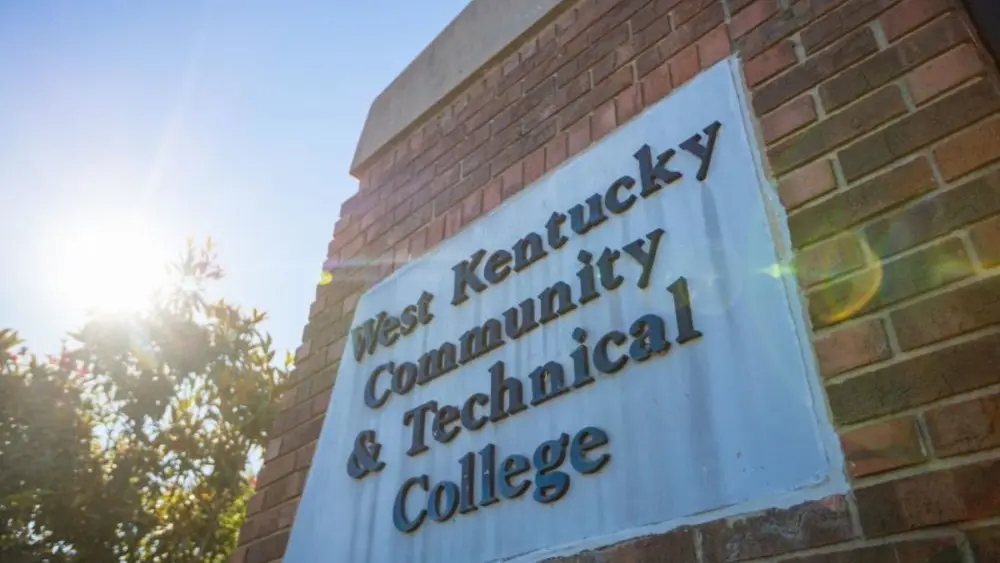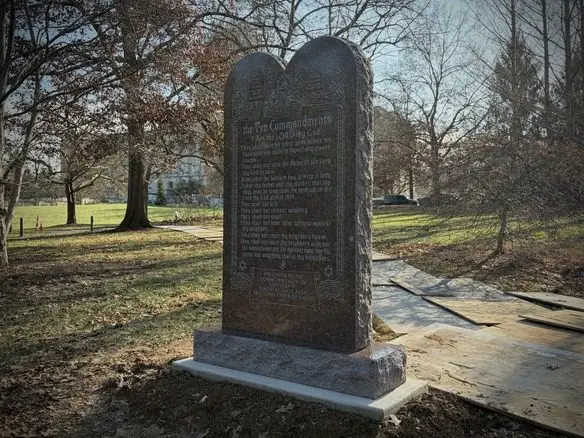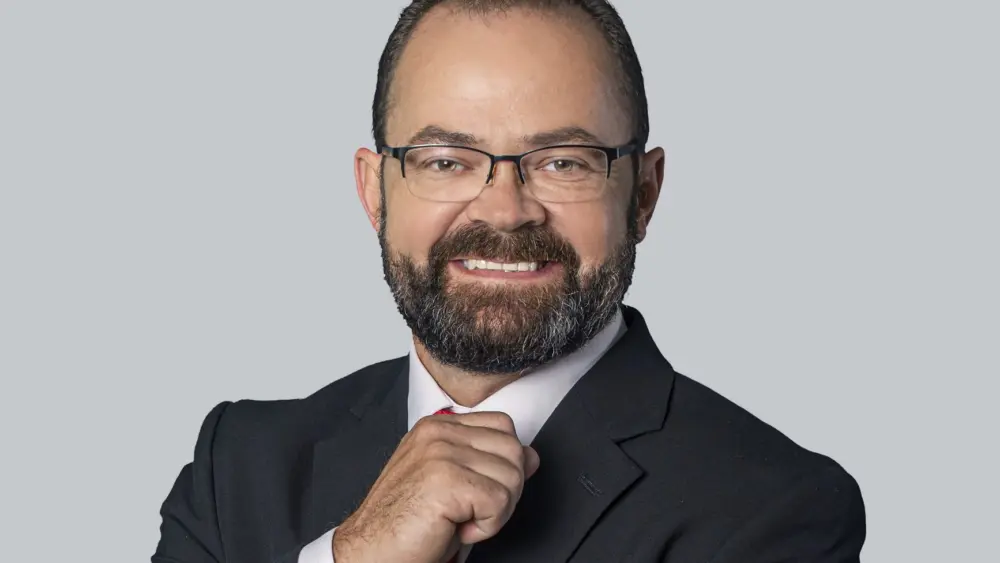
Benton Police Chief Tracy Watwood (front, second from left) and BPD officers sit for a department photo. Watwood reflected on time spent in the department from which he will retire July 31.
Benton Police Chief Tracy Watwood has spent the better part of his career working to improve the role of whatever capacity he holds. After almost 20 years at BPD – having spent the last eight as chief – he’s stepping aside to give someone else a chance to do the same.
Watwood announced his intent to retire from the department on Friday, a change that will take effect July 31. Though Watwood knew he wanted to retire when he’d reached the window of time that he was able, it wasn’t an easy decision. However, it was a move he said he knew would allow new talent to step in and continue the department’s growth.
“The hardest decision to make about retiring was not, do I want to retire? Because I wanted to when I was eligible to,” he said. “To me it’s not about the position. I told the mayor, ‘I need to go, because I’m holding somebody back.’ I’ve been here long enough, it’s time to allow somebody else to be successful and take this farther than I can take it. I’m perfectly fine with stepping away from that. It’s the guys. As far as me going home, I can ride off into the sunset and be OK.”
Watwood began his career with the Barlow City Police upon graduation from Eastern Kentucky University, a school he chose based on its police administration program. BCP sent him to the police academy, and he stayed with the department about two years before moving on to the Ballard County Sheriff’s Department.
He was there, and happy with his position, when he got a call from former Benton Police Chief Ted Thompson in 1998 asking Watwood to consider coming to his department. It almost seemed like divine intervention in the way things played out thereafter.
“I came up and talked to Ted, at that time Kristi and I were building a house in Ballard County,” Watwood said. “… I was excited about what Ted had to offer, and Benton was a huge step for me, but at the same time, you know, Ballard was home. It was just where I’d always been. So, I told Ted – I tried to use the excuse that I was building a house and that I had no intentions of ever moving out of Ballard County – and he told me, he said, ‘I don’t care where you live, as long as you get to work on time.’
“I had a figure in my mind, and I had no idea what the city of Benton paid … and I thought, ‘well if he can get close to this figure I might consider it,’” Watwood added. “So we talked for a while, and at the end of our conversation he said, ‘Well you haven’t even asked what the pay is.’ And I said, ‘Well, it’s not that important to me. The important thing is happiness, you know, enjoying what I do.’ And he said, ‘Well, this is what it would be an hour, and that equals roughly this per year.’ And he gave me two numbers, and I was like, dang. That’s exactly – I mean to the penny – what I thought I would have to be offered. I thought, well, shoot. That makes it a whole lot harder.”
Watwood spoke to his sheriff, Todd Cooper, who encouraged him to take the position. He did, and for five years he drove from Ballard County. When he was promoted to sergeant in 2003, he said he felt it was unfair to the department and city residents for him to reside elsewhere, and he and his family sold their home and moved to Benton.
The decision to come to Benton, and truthfully, his career in law enforcement was one he never regretted, though the choice to become a police officer had not necessarily been a life-long dream. Watwood said it had actually been the result of a meeting with his high school guidance counselor and a challenge she laid before him. The eventual chief had little ambition for school other than athletics, but as a junior he was required to meet with a guidance counselor to discuss career and college goals. Watwood said it all began when she asked him what he’d like to do, and police officer just popped into his head.
“I’ll never forget, when I said, ‘I want to be a police officer,’” he said. “… She took her glasses, and she had them on and she took them off and she chewed on the earpiece and she stared at me, and it seemed like forever. She set her glasses down, and she said, ‘Tracy,’ and she looked at me and she said, ‘I think you need to find a different career. … I don’t think you can do that.’ … We talked for probably 30 minutes, and 45 seconds is all I remember. But I left her office … mad. From that I guess determination kicked in. … The rest is history, simply because a guidance counselor challenged me and told me I couldn’t do it. She knew exactly what the rest of my teachers knew. You tell me I’m not going to do something, and I’m going to do it.”
And he’d do it all over again. Watwood said that he’d taken away some wonderful memories in the last 24 years, building cameradarie among fellow officers and relationships with people in the town he now calls home. Though, it took him just a bit to get acclimated to Benton, he said. Watwood recalled his very first call as a BPD officer.
“Went to work and knew nothing about Benton,” Watwood said. “… Ted told me, just go out there and drive around and get familiar with the place. … This was within the first two or three days I worked for Benton. I was driving around, and they called me on the radio. I knew what my badge number was, which was nine, I knew that, but it didn’t click with me because that’s not the number I used to be at Ballard. So, they had to call me three or four times. And Michelle Lovett, who has since passed away but she was dispatching, and she finally about the fourth time she called me I was like, ‘Oh shoot, that’s me.’ So I answered in the most professional voice I had … so I said, you know, ‘Go ahead.’ And she said, ‘You need to go work a 1045 in Prince and Brien’s law office parking lot.’ And I thought, ‘Man, I don’t have a clue.’ If it was an address, give me an address and you know, I could drive to an address, but give me a name, I don’t know. So, what did I do? In my professional voice I said, ‘Central, you’re going to have to help me out with directions to that location.’ And she keyed up the mic, and in her professional voice she said, ‘The police department shares a parking lot with Prince and Brien Law Office.’ Oh geez. So, that was the first call that I ever had in Benton was a wreck in the police department parking lot and I didn’t know where it was at.”
However, it’s not an easy job. Watwood said he’d missed birthday parties, anniversaries and more, and he’d tried to build his leadership around making sure his officers didn’t have to do the same if it was in his power. And just as he’s built good memories, he said he had other memories he wished he could forget.
“There’s calls that stick in your mind, and people that stick in your mind,” he said. “I remember a vehicle collision where the old NAPA is at 13th and Poplar. An elderly man was … driving, crossing the street and his vehicle got struck and it turned up on its hood. I climbed in the vehicle with him and held his hand, knowing that he’s going to pass away. And lying to him, telling him ‘everything’s going to be OK,’ and physically holding his hand while he takes his last breath. Things like that, you just don’t forget about.”
Perhaps his most memorable heartache came from a little girl he’d come to know during his time at the school crossing post. He couldn’t tell you her name without looking, but her face and her smile hang in the memorial of her he keeps on the wall of his office.
“She drowned,” Watwood said. “She was with her dad, and their vehicle went off in the river, back in 2001. … But I used to do school crossing, and she used to come up to me every day and pick at me. Super personality. And I don’t know why she touched me like she did, but she was just one of those people that she just beamed with joy and energy and excitement. I’ve moved offices three times since she died, and that’s (the memorial) the last thing I always take out and pack up of my old office and the first thing I always put up in my new office. When I leave this office, that will be the last thing that gets taken off the wall. … I walk by that … and it’s a daily reminder of why I do what I do. That picture has probably kept me going on times where I wanted to give up. … You have to have something like that to keep going. … If I ever have another (office) job, it’ll be the first thing that I unpack.”
He’s got no immediate plans to head to another office job, though. Watwood said he knew it would be difficult to leave, but he intended to take the time to focus on himself and the direction he wanted to take moving forward. His father-in-law works farmland in Ballard County, and he said he would work to help out on the farm and just not think about it too much for the time being.
Benton Mayor Rita Dotson said his role won’t be an easy one to fill, and she’ll miss the cut up she’s come to know throughout the last 10-plus years in her time as councilwoman and then mayor. Dotson said Watwood had put his heart into the department.
“Tracy’s fun,” Dotson said. “He has a great sense of humor. We cut up and laugh fairly frequently about different things, but he’s also kind of to himself. He’s very professional. … He’s ran the office in a very professional way. He’s promoted the Benton Police Department; I think it’s a place where a lot of officers would like to work because of the atmosphere in there. He’s gotten the pay good for the officers, and he’s promoted to where we have enough that two can work per shift. So, he’s done a lot of good things for the police department, and I think that his men very much respect him.
“ … We’ve had a great working relationship,” Dotson added. “I’ll miss him. He’s just done a great job … with the guys and with the department. And with the city, I mean, he’s tried to put his heart into the job and not only be a police officer, but be a DARE officer and be out in the community.”
Dotson remembered before her time as a city official some of her initial interactions with Watwood centered around her son Tyler.
“I remember when Tyler was really small, and … I worked at Puckett’s Jewelry at the time, and I would pick him up at school and he would walk back up to Puckett’s with me,” Dotson said. “Tracy was a new officer pretty much at the time. And we’d walk by, and he’d tell Tracy, ‘Let me shoot your water pistol.’ … And Tracy would just laugh. You know, he didn’t know us from Adam, but he just thought it was so funny. He always handled himself well.”
Dotson said she had polled Benton City Council members to see how they wanted to proceed with filling the position. The council intends to advertise the position to solicit resumes; those within the department would be encouraged to apply, as well.
“Their intent is to put an ad in the paper, advertise for, just to see what they get,” Dotson said. “That doesn’t mean that they won’t promote from within. … It’s basically just to see what they want to do.”
The council will likely have to appoint an interim chief to serve in the role until a permanent replacement is chosen.
“Chief saw that he could retire in a window there, and he chose to take it, so it didn’t allow us a lot of time – and I certainly don’t blame him at all – but it didn’t allow us a whole lot of time to be able to advertise and then sift through the applications,” Dotson said. “I’ll form a committee to do the interviewing. … I think ultimately what they’ll end up doing is sifting through all the applications and picking maybe, I’d say, between three and five to interview. You know, the chief thinks we will probably have a lot of outside interest, and that’s just speculation. There’s no way for us to know that. … We’ll have to wait and see.”
In the meantime, Watwood will continue working his normal schedule until his last day. In all, he hopes only that he improved the office, and that residents and his fellow officers know he cared.
“Looking back, since 2009, I cannot remember making a decision that was beneficial for Tracy Watwood,” he said. “The decisions I made was based solely on what’s best for the city or what’s best for this police department. … You change people’s lives by helping them, but at the same time you make a lot of enemies. I think the thing that I struggle with the most, is that you know your friends. I’ve had people come up to me and say, ‘You changed my life, I appreciate you.’ And that’s all fine and good, but that’s what I’m for. That’s what police officers should strive for. It’s not for the pay or anything else, it’s to change people’s lives and to help people.”






